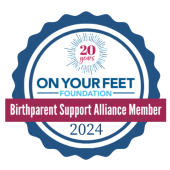
Considering adoption is a deeply personal and emotional decision. For many birth mothers, the choice to place a child for adoption can involve a mix of emotions including love, hope, uncertainty, and even grief. In this guide, we’ll help you understand how adoption works, providing you with the information and support you deserve as you decide what the best plan for you and your child is.
Initial Considerations
1. Research and Reflection
Start by gathering information about how adoption works. Seek out credible sources, consult with adoption professionals, and if possible, connect with others who have also gone through something similar as you.
Reflect on your reasons for considering adoption and what you hope to achieve for your child and yourself. This introspection will help guide you and find clarity in your decision.
Selecting a reputable adoption agency is crucial. An experienced agency will provide support and resources, and ensure that all legal aspects of the adoption are handled correctly.
Ask about their process, what you can anticipate in working with them, and support services available to you before and after delivering.
Counseling can be an invaluable support as you navigate how adoption works. Professional adoption counselors can offer emotional support, help you process your feelings, and assist you as you determine what plan is the right fit for you.
Legal counsel is also beneficial. Adoption laws vary by state, and having an accredited adoption attorney or agency to guide you through the legal process will ensure your rights are protected.
The Adoption Process
An adoption plan outlines your preferences and decisions regarding the adoption. This includes the type of adoption (open, semi-open, or closed), the kind of family you’d like your child to be placed with, and any post-adoption contact you wish to maintain.
Work with your agency and counselor to develop a plan that reflects your wishes.
Agencies typically have profiles of prospective adoptive parents. You will have the opportunity to review these profiles and select a family that resonates with you.
Once you’ve chosen a family, you may meet them (if desired) to ensure it’s a good fit. From there, you may begin building a relationship that can continue as your child grows.
As your due date approaches, work with your agency to create a hospital plan. This plan will outline your preferences for labor and delivery, including who will be present and how much interaction you wish to have with the adoptive family at the hospital.
Knowing your options and having a plan can provide peace of mind during what can be an emotionally intense time. It is important to know that this is your time to spend with your child, and your wishes should be respected.
Signing legal documents is a significant part of the adoption process. These documents include relinquishing your parental rights and consenting to the adoption.
It’s important to fully understand each document before signing. Your attorney or adoption agency will help explain the paperwork and implications, so that you are fully aware and comfortable with every detail before signing.
Adoption doesn’t end with the placement of your child. Post-adoption support is crucial for both birth mothers and adoptive families.
Your agency should provide ongoing counseling and support during this emotional time as you adjust to life after adoption.
Selecting the Right Adoptive Family
- Characteristics: Consider what qualities are important to you in an adoptive family. This could include their values, lifestyle, cultural background, religion, and whether they have other children.
- Meetings: If you desire, your adoption agency may arrange for you to meet or speak with prospective families. This can help you get to know them better and feel confident that they are the right family for your child.
- Instincts: Trust your instincts. It’s important to feel comfortable and confident in your choice. Only you can decide what is the right plan for your child.
- Questions: Prepare a list of questions to ask prospective families. Topics might include their parenting philosophy, experiences with adoption, plans for maintaining your child’s cultural heritage, or anything else that is important to you.
Hospital and Birth Plan
Key Elements of a Hospital Plan
- Labor Preferences: Decide who you want to be with you during labor and delivery. This could include a loved one, friend, or even the prospective adoptive parents.
- Contact with Adoptive Family: Specify how much interaction you want with the adoptive family at the hospital. Some birth mothers prefer to spend time with their baby alone, while others like to spend time with the adoptive parents or even have the adoptive parents spend time alone with the baby.
- Post-Birth Arrangements: Outline your wishes for holding, feeding, and spending time with your baby after birth. This can be an emotional time, however, having those memories of the time spent with your child in the hospital can be a great comfort in the future.
Financial Considerations
- Medical Costs: Prenatal care, hospital delivery expenses, and postnatal care for birth mothers are typically covered by your insurance. Depending on state laws where you reside, the adoptive family may be able to assist with hospital bills or copays.
- Living Expenses: Depending on state laws and agency policies, some living expenses such as rent, utilities, maternity clothing, and groceries may be covered during part of your pregnancy.
- Legal Fees: Again depending on the state you reside in, you may have the option to have an attorney provided at no cost to you.
For those interested in learning more about how adoption works and seeking personalized support, we invite you to visit our website at Adoption Center for Family Building or contact us directly through our contact page. Our team is here to guide you through every step with compassion and expertise.





